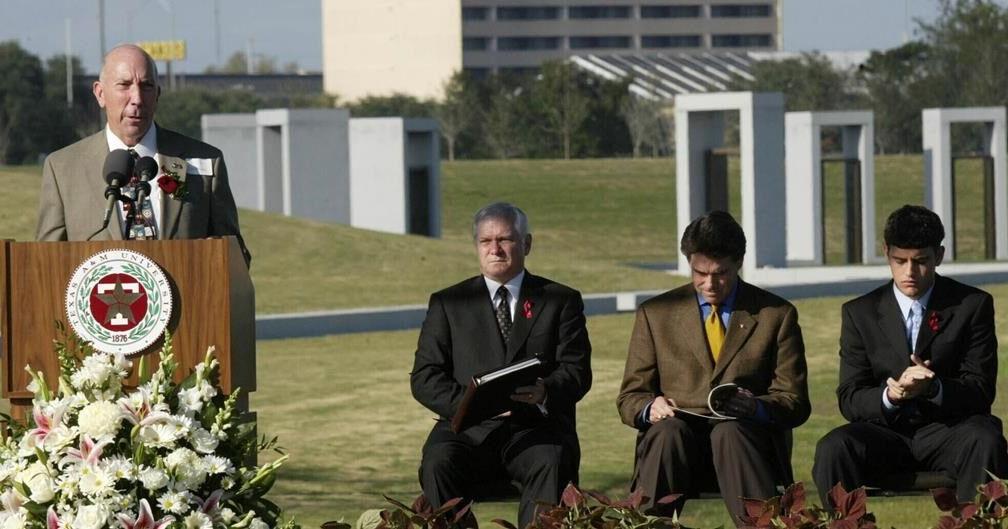The first, ominous sounds came from deep within the massive stack of logs in the darkest hours of the Texas night. Witnesses described hearing the stack of thousands of logs moan and creak before the crack of the center pole as it snapped, then collapsed.
More than a million pounds (450,000 kilograms) of timber tumbled. In an instant, 12 people were killed, dozens more were injured and a university campus rooted in traditions carried across generations of students was permanently scarred.
Texas A&M University is set to mark 25 years since the log stack collapsed in the early hours of Nov. 18, 1999. It was being built in preparation for the annual bonfire ahead of the Texas A&M-Texas rivalry football game in College Station.
The school will hold a Bonfire Remembrance ceremony at the site of the tragedy on Monday at 2:42 a.m., about the time the stack collapsed.
“Year after year, Texas A&M students have worked to ensure that we never forget those members of the Aggie Family who were taken from us 25 years ago,” school President Mark Welsh III said.
The tradition
The “Fightin’ Texas Aggie Bonfire” ranked among the most revered traditions in college football and symbolized the school’s “burning desire” to beat the University of Texas Longhorns in football. The first bonfire in 1907 was a scrap heap that was set ablaze. By 1909, it was a campus event and the bonfire stack kept growing as railroad lines were used to ship in in carloads of scrap lumber, railroad ties and other flammable materials, according to the school.
It reached a record height of 105 feet (32 meters) in 1969 before administrators, concerned about a fire hazard, imposed a 55-foot (17-meter) limit. Over the years, the stack evolved from a teepee-style mound into the vertical timber formation, a shape similar to a tiered wedding cake, that collapsed in 1999.
The annual bonfire attracted crowds of up to 70,000 and burned every year through 1998. The only exception was in 1963, after the assassination of President John F. Kennedy.
The tragedy
The stack of more than 5,000, 18-foot (5.5-meter) logs toppled a week before it was scheduled to burn. The 12 who were killed included five freshmen, four sophomores, a junior, a senior and a recent graduate. Several were members of the Corps of Cadets, Texas A&M’s student-led, military-style organization that played a large role in its construction.
Rescuers, including members of the Texas A&M football team, raced to remove the logs that had trapped and crushed some of the victims. At rival Texas, Longhorns players organized a blood drive to assist the survivors.
An investigative report cited multiple causes for the collapse, from flawed construction techniques to a lack of supervision by the university over the students building the bonfire stack. The lowest level of the pile did not have proper support wiring, and excessive stress on the bottom level was compounded by wedging logs into gaps.
Campus memorial
In 2003, the school dedicated a memorial on the spot where the stack fell. It includes a “Spirit Ring” with 12 portals representing those who were killed. Each portal contains an engraved portrait and signature of a victim and points toward their hometown. By stepping into the open archway, the visitor symbolically fills the void left by the deceased.
Efforts to rekindle the bonfire tradition
The annual Aggie bonfire was discontinued as an official school event after the deadly collapse.
The school considered reviving the tradition this year to coincide with the renewal of the Texas-Texas A&M football rivalry on Nov. 30. The rivalry split in 2012 when Texas A&M left the Big 12 Conference for the Southeastern Conference, but has resumed this year as Texas joined the SEC.
A special committee recommended resuming the bonfire, but only if the log stack was designed and built by professional engineers and contractors. Some members of the public said it should not come back if it was not organized and built by students, according to tradition.
Welsh ultimately decided the bonfire would not return to campus.
“Bonfire, both a wonderful and tragic part of Aggie history, should remain in our treasured past,” the president said in June when he announced his decision.
Students have continued to organize and build unofficial off-campus bonfires over the years and plan to burn this year’s edition on Nov. 29, the night before the Texas A&M-Texas football game.
























